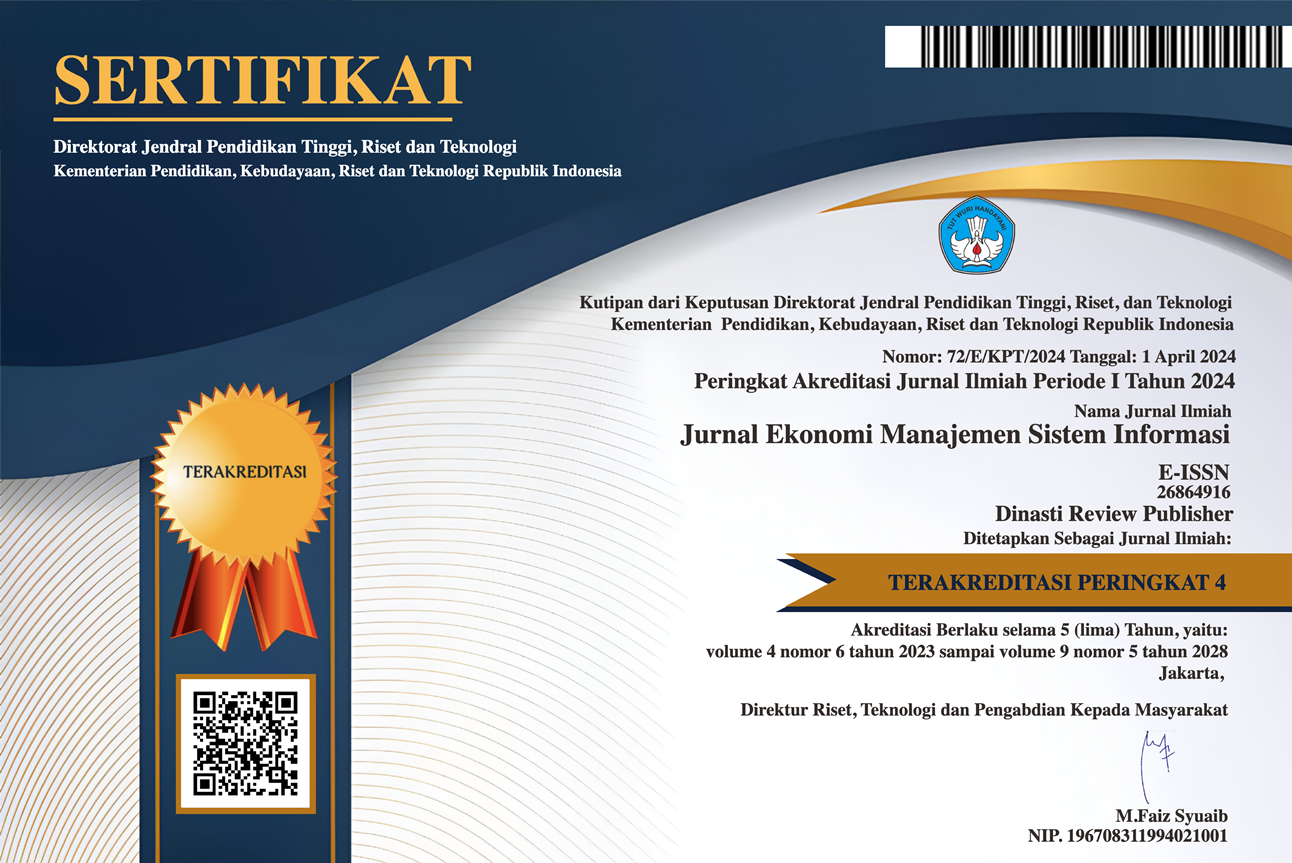PENTINGNYA PERANAN KOMUNIKASI DALAM ORGANISASI: LISAN, NON VERBAL, DAN TERTULIS (LITERATURE REVIEW MANAJEMEN)
DOI:
https://doi.org/10.31933/jemsi.v3i3.817Keywords:
Komunikasi, Lisan, Non Verbal, TertulisAbstract
Dalam suatu organisasi diperlukan adanya komunikasi, karena komunikasi terjadi ketika seseorang ingin menyampaikan informasi kepada orang lain. Informasi yang disampaikan dapat membuat orang lain memiliki persamaan maupun perbedaan maknanya. Persamaan dan perbedaan tersebut disebabkan oleh persepsi mereka yang terlibat dalam proses komunikasi. Pokok masalah yang diajukan pada artikel ini adalah masalah komunikasi yang ada pada sebuah organisasi. Komunikasi di dalam organisasi tentunya berbeda dengan komunikasi yang dilakukan di khalayak/masyarakat, selain faktor situasi kemampuan komunikasi juga disesuaikan dengan kondisi/keadaan yang terjadi di masyarakat. Masalah komunikasi dalam organisasi biasanya terjadi pada karyawan atau orang–orang yang bersangkutan pada perusahaan itu. Tujuan penulisan artikel ini guna membangun hipotesis pengaruh antar variabel untuk digunakan pada riset selanjutnya.
References
Ansori, A., & Ali, H. (2017). Analisis Pengaruh Kompetensi Dan Promosi Terhadap Kinerja Pegawai Negeri Sipil Pada Sekretariat Daerah Kabupaten Bungo. Jurnal Ilmiah Universitas Batanghari Jambi. https://doi.org/10.33087/jiubj.v15i1.198
Brata, Husani, Hapzi, Baruna Hadi Shilvana AliBrata, Husani, Hapzi, B. H. S. A. (2017). Saudi Journal of Business and Management Studies CoBrata, Husani, Hapzi, Baruna Hadi Shilvana AliBrata, Husani, Hapzi, B. H. S. A. (2017). Saudi Journal of Business and Management Studies Competitive Intelligence and Knowledge Management: An Analysis of t. Saudi Journal of Business and Management Studies. https://doi.org/10.21276/sjbms
Brata, B. H., Husani, S., & Ali, H. (2017). a Comparative Study on Development Off Small and Medium Enterprises (Smes) in Japan and Malaysia. Saudi Journal of Business and Management Studies. https://doi.org/10.21276/sjbms
Borchers, Nils S. (2021). Managing strategic influencer communication: A systematic overview on emerging planning, organization, and controlling routines. Public Relations Review
Cho, Moonhee. (2021). When an organization violates public expectations: A comparative analysis of sustainability communication for corporate and nonprofit organizations. Public Relations Review
Desfiandi, A., Fionita, I., & Ali, H. (2017). Implementation of the information systems and the creative economy for the competitive advantages on tourism in the province of Lampung. International Journal of Economic Research.
Elmi, F., Setyadi, A., Regiana, L., & Ali, H. (2016). Effect of leadership style, organizational culture and emotional intelligence to learning organization: On the Human Resources Development Agency of Law and Human Rights, Ministry of Law and Human Rights. International Journal of Economic Research.
Falkheimer, Jesper. (2017). Is Strategic Communication too important to be left to Communication Professionals?: Managers’ and coworkers’ attitudes towards strategic communication and communication professional. Public Relations Review
Harini, S., Hamidah, Luddin, M. R., & Ali, H. (2020). Analysis supply chain management factors of lecturer’s turnover phenomenon. International Journal of Supply Chain Management.
Kharouf, Husni. (2020). Understanding online event experience: The importance of communication, engagement and interaction. Journal of Business Research
Mukhtar, Risnita, Saifillah, M. S., & Ali, H. (2016). Effect of knowledge management and work commitment to employees satisfaction services (Study on teacher Madrasah Aliyah Country Jambi Province). International Journal of Economic Research.
Prayetno, S., & Ali, H. (2020a). Entrepreneurial supply chain management competence: Predictors of work motivation advocate. International Journal of Supply Chain Management.
Prayetno, S., & Ali, H. (2020b). The influence of work motivation, entrepreneurship knowledge and advocate independence on advocate performance. International Journal of Innovation, Creativity and Change.
Purba, C. B., Arzio, & Ali, H. (2017). The influence of compensation, working environment and organization culture on working productivity of BPJS (workers social security agency) employment staff in Rawamangun Branch. Man in India.
Richardo, Hussin, M., Bin Norman, M. H., & Ali, H. (2020). A student loyalty model: Promotion, products, and registration decision analysis-Case study of griya english fun learning at the tutoring institute in wonosobo central Java. International Journal of Innovation, Creativity and Change.
Ridwan, M., Mulyani, S. R., & Ali, H. (2020). Building behavior and performance citizenship: Perceived organizational support and competence (case study at SPMI private university in west Sumatra). International Journal of Psychosocial Rehabilitation. https://doi.org/10.37200/IJPR/V24I6/PR260195
Salmon, Charles T. (2019). Third-person effect in the context of public relations and corporate communication. Public Relations Review
Seitz, Stephanie R. (2021). Stuttering: Stigma and perspectives of (dis)ability in organizational communication. Human Resource Management Review
Toto Handiman, U., & Ali, H. (2019). The Influence of Brand Knowledge and Brand Relationship On Purchase Decision Through Brand Attachment. In International Journal of Business Marketing and Management (IJBMM).
Widayati, C.C., Ali, H., Permana, D., & Nugroho, A. (2020). The role of destination image on visiting decisions through word of mouth in urban tourism in Yogyakarta. International Journal of Innovation, Creativity and Change, 12(3).
Widayati, Christina Catur, Ali, H., Permana, D., & Nugroho, A. (2020). The role of destination image on visiting decisions through word of mouth in urban tourism in Yogyakarta. International Journal of Innovation, Creativity and Change.
Yacob, S., Sucherly, Sari, D., Mulyana, A., & Ali, H. (2020). An Optimising strategy for minimarket modern retail business performance in Indonesia. International Journal of Innovation, Creativity and Change.
Downloads
Published
How to Cite
Issue
Section
License
Hak cipta :
Penulis yang mempublikasikan manuskripnya di jurnal ini menyetujui ketentuan berikut:
- Hak cipta pada setiap artikel adalah milik penulis.
- Penulis mengakui bahwa Jurnal Ekonomi Manajemen Sistem Informasi (JEMSI) berhak menjadi yang pertama menerbitkan dengan lisensi Creative Commons Attribution 4.0 International (Attribution 4.0 International CC BY 4.0) .
- Penulis dapat mengirimkan artikel secara terpisah, mengatur distribusi non-eksklusif manuskrip yang telah diterbitkan dalam jurnal ini ke versi lain (misalnya, dikirim ke repositori institusi penulis, publikasi ke dalam buku, dll.), dengan mengakui bahwa manuskrip telah diterbitkan pertama kali di Jurnal Ekonomi Manajemen Sistem Informasi (JEMSI).










































































